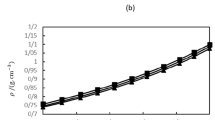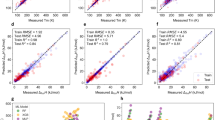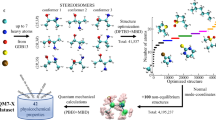Abstract
FROM some work employing the Bethe technique, I deduced1 a formula for the number of configurations of mixtures of p-mer and single molecules on a lattice. Afterwards, a kinetic derivation of this formula, together with its generalization to the case of a mixture of simple or branched chain molecules of any number of species, was given by Guggenheim2 using the principle of detailed balancing. The formula in question can be written in the form: where qiz is the number of sites which are closest neighbours of a molecule of species i which contains ri submolecules (a slight modification of the definition covers the case of flexible open-chain molecules which can bend back on themselves), and the other symbols have their customary meanings. The value of qi is given by
This is a preview of subscription content, access via your institution
Access options
Subscribe to this journal
Receive 51 print issues and online access
$199.00 per year
only $3.90 per issue
Buy this article
- Purchase on SpringerLink
- Instant access to full article PDF
Prices may be subject to local taxes which are calculated during checkout
Similar content being viewed by others
References
Proc. Camb. Phil. Soc., 39, 54 (1943).
Proc. Roy. Soc., A, 138, 203 (1944).
Author information
Authors and Affiliations
Rights and permissions
About this article
Cite this article
MILLER, A. Statistical Thermodynamics of Mixtures. Nature 157, 842–843 (1946). https://doi.org/10.1038/157842d0
Issue date:
DOI: https://doi.org/10.1038/157842d0
This article is cited by
-
Thermodynamik und Statistik hochmolekularer Lösungen. I
Kolloid-Zeitschrift (1948)



